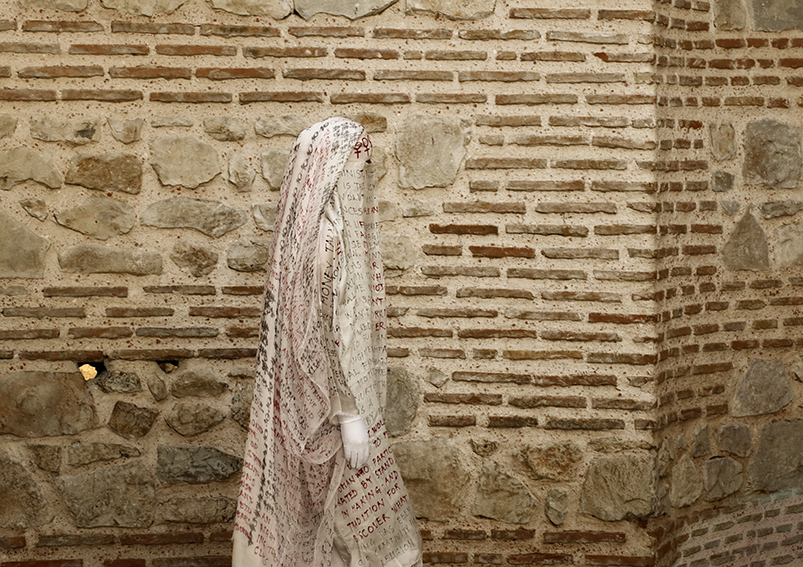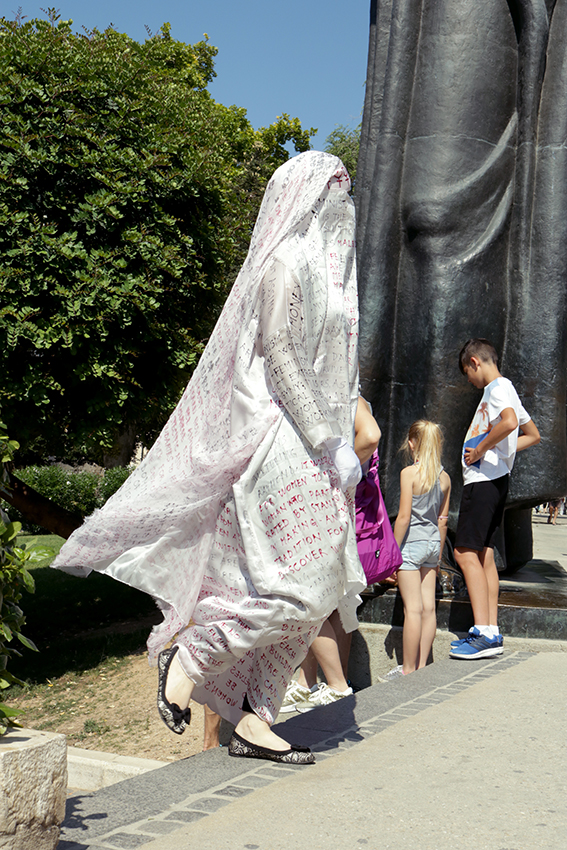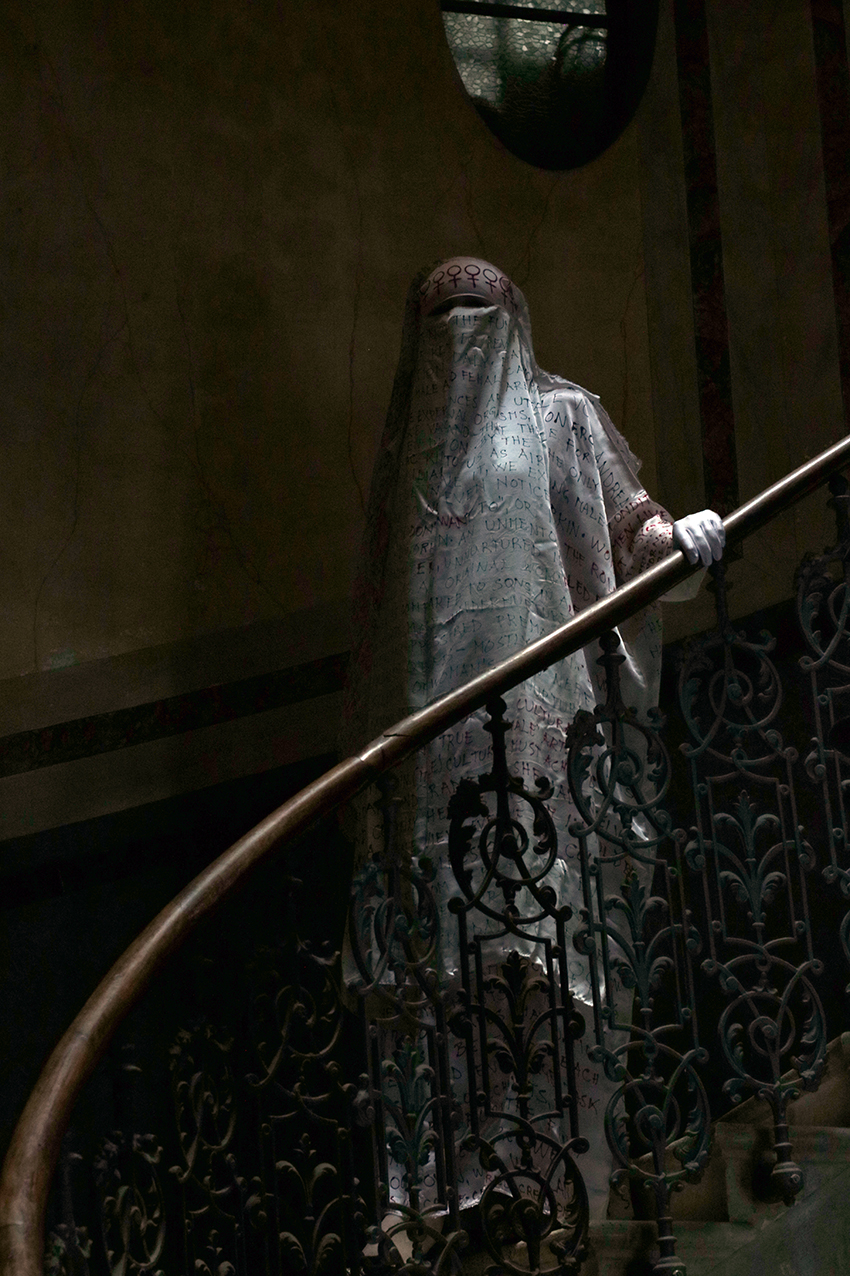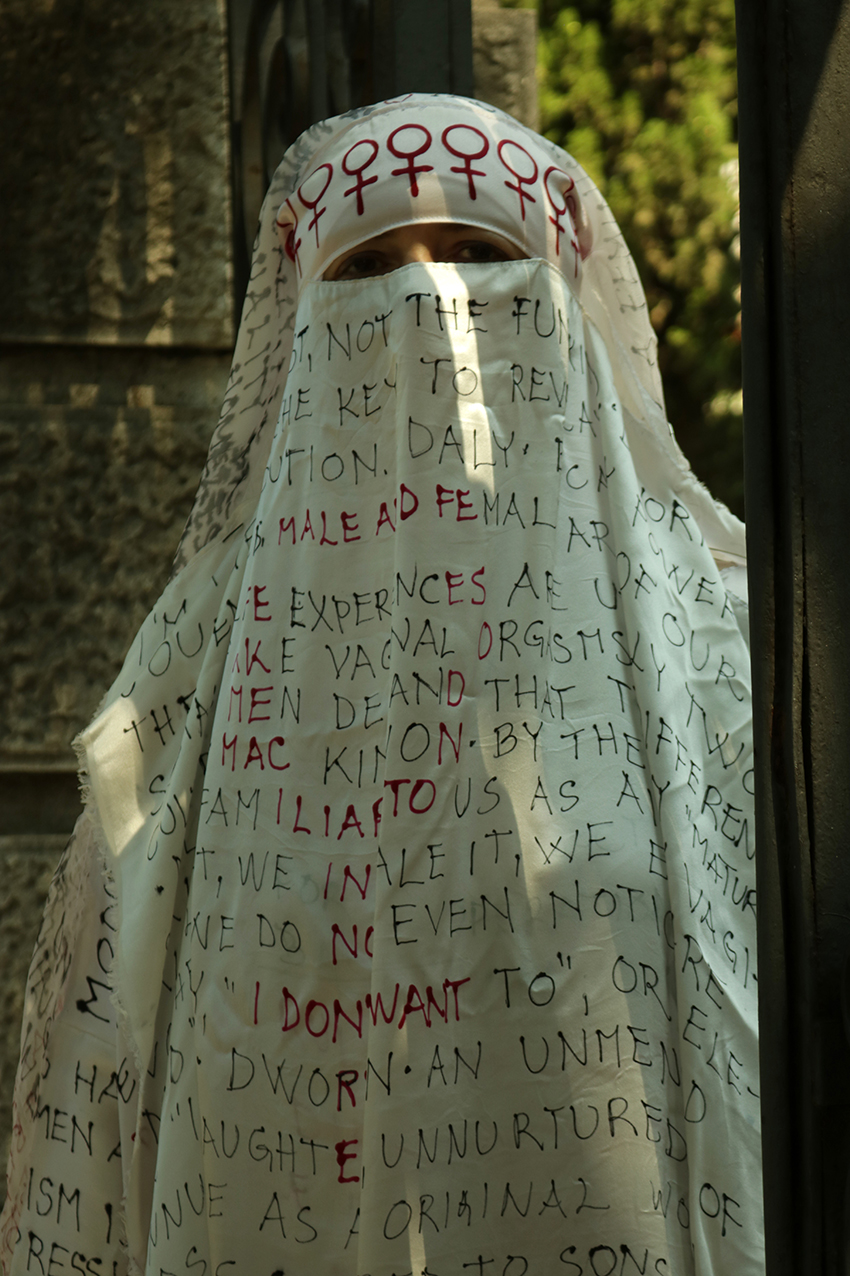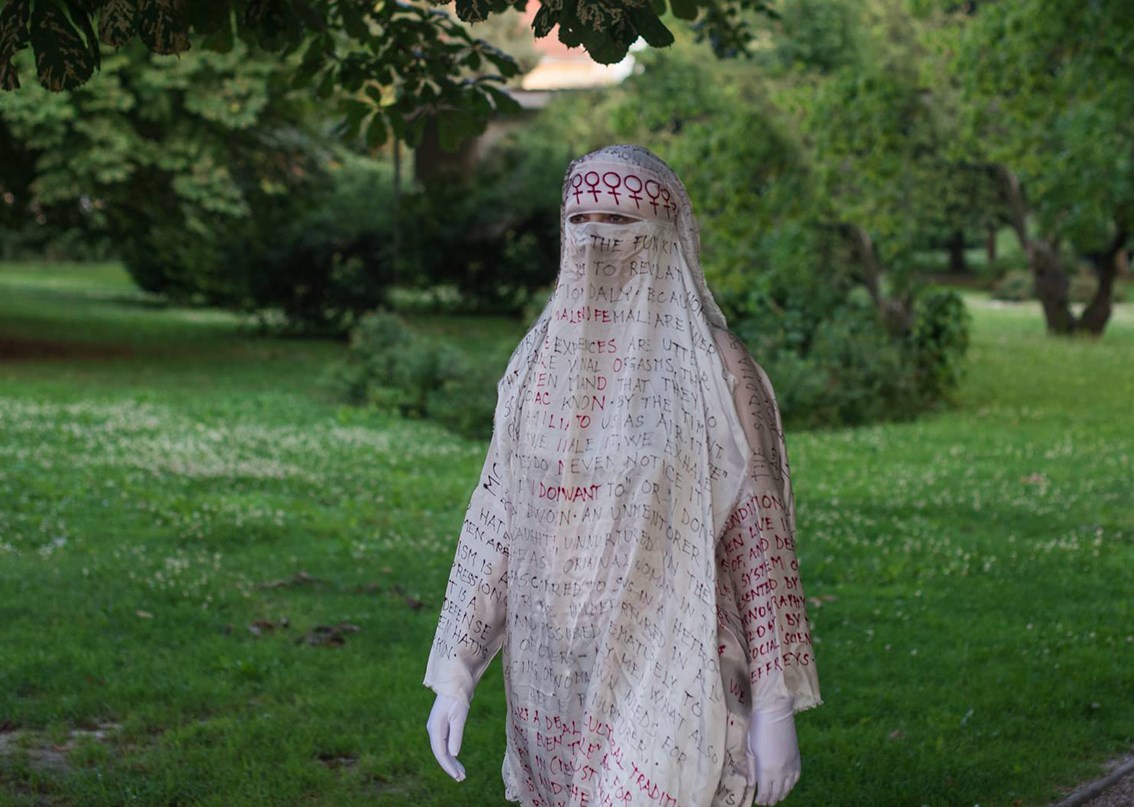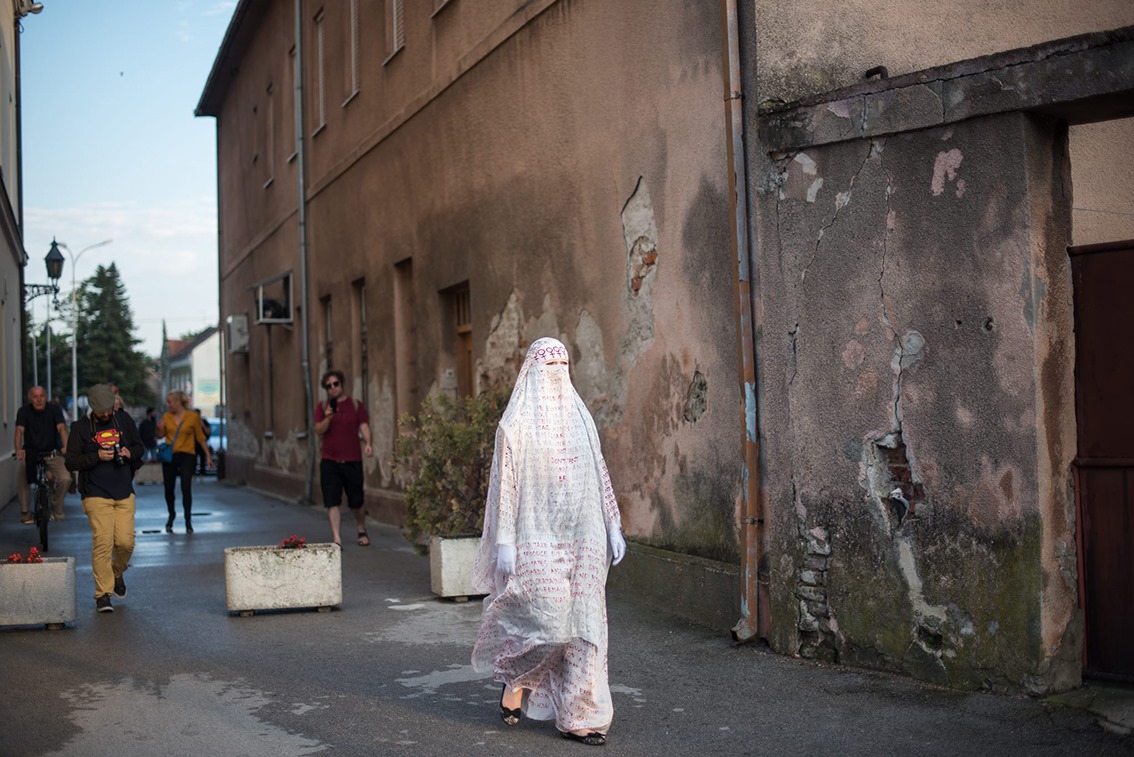Perforations festival, Split; Perforations festival, Koprivnica
The work is inspired by how "Western culture" perceives and interprets "Eastern culture". I am primarily concerned with the retro-patriarchal structures often associated with Islamic societies — structures that may seem foreign or extreme from a Western perspective, yet echo persistently in Western institutions, laws, and daily life. Patriarchy wears different clothes, but speaks the same language.
Many women who wear the niqab describe it as a form of protection — a shield against the male gaze and a way to feel safer in public spaces. This is something feminist thought can engage with meaningfully, especially given the global scale of sexual and gender-based violence.
As a woman and a feminist who grew up in a Bosnian/Muslim family in Croatia, I carry not only cultural memory but also the experience of being perceived — and sometimes labeled — through that lens. Even when one is not religious, the projections remain. The niqab, in this context, becomes not just a garment, but a surface onto which meaning is constantly imposed.
In this work, I attempt to physically and ideologically inhabit the niqab: not as a religious statement, but as a feminist intervention. By transforming myself and the garment into a walking poster-sculpture, I seek to challenge dominant narratives about the veil, agency, and visibility — offering instead an image that is both veiled and resistant, silent and political.
...
Quotes used on the niqab are as follows:
Both the veil and makeup are often seen as voluntary behaviours by women, taken up by choice and to express agency. But in both cases there is considerable evidence of the pressures arising from male dominance that cause the behaviours. For instance, the historian of commerce Kathy Peiss suggests that the beauty products industry took off in the USA in the 1920s/1930s because this was a time when women were entering the public world of offices and other workplaces (Peiss, 1998). She sees women as having made themselves up as a sign of their new freedom. But there is another explanation. Feminist commentators on the readoption of the veil by women in Muslim countries in the late twentieth century have suggested that women feel safer and freer to engage in occupations and movement in the public world through covering up (Abu-Odeh, 1995). It could be that the wearing of makeup signifies that women have no automatic right to venture out in public in the west on equal grounds with men. Makeup, like the veil, ensures that they are masked and not having the effrontery to show themselves as the real and equal citizens that they should be in theory. Makeup and the veil may both reveal women’s lack of entitlement.”
― Sheila Jeffreys, Beauty and Misogyny: Harmful Cultural Practices in the West
“Masculinity cannot exist without femininity. On its own, masculinity has no meaning, because it is but one half of a set of power relations. Masculinity pertains to male dominance as femininity pertains to female subordination.”
― Sheila Jeffreys, Unpacking Queer Politics: A Lesbian Feminist Perspective
“The sadomasochistic mentality and movement assimilate women into a sexual liberation that is none other than the unrestrained expression of male-defined sexual behavior, where sexual liberation is tantamount to doing whatever one “feels” like doing. We confront again the tyranny of feelings, where feelings are portrayed almost as deterministic sexual drives that must be expressed at all costs. This is a very reactionary mentality which in one sense replicates the cultural conception of male sexuality. Men have always been portrayed as “needing” to express their “natural” sexual urges.”
― Janice G. Raymond, A Passion for Friends (Toward a Philosophy of Female)
We are women. We are a subject people who have inherited an alien culture. Kate Millett
Many women do not recognize themselves as discriminated against; no better proof could be found of the totality of their conditioning. Kate Millett
Feminism, Marxism, Method, and the State: An Agenda for Theory (1982)
Women and men are divided by gender, made into the sexes as we know them, by the social requirements of heterosexuality, which institutionalizes male sexual dominance and female sexual submission.
Catharine MacKinnon
To be a prisoner means to be defined as a member of a group for whom the rules of what can be done to you, of what is seen as abuse of you, are reduced as part of the definition of your status.
"Francis Biddle's Sister: Pornography, Civil Rights, and Speech" (1984)
Catharine MacKinnon
[W]omen under phallocratic rule are confined to the role of vessels/carriers, directed and controlled by men. Since that role is the basic base reversal of the very be-ing of Voyaging/Spiraling women, when we direct our own Crafts/Vessels we become reversers of that deadly reversal.
Gyn/Ecology Mary Daly
Hags do not haggle over "equality," for we know there is no equality among unique Selves. Noting that one definition of the term equal is "capable of meeting the requirements of a situation or a task," Jan Raymond observes that what each asks of the other is that she be equal to the task at hand.... Crones expect and en-courage each other to become sister pyrotechnists, building the fire that is fueled by Fury, the fire that warms and lights the place where we can each have a loom of our own, where we can spin and weave the tapestries of Crone-centered creation.
Gyn/Ecology Mary Daly
The common erotic project of destroying women makes it possible for men to unite into a brotherhood; this project is the only firm and trustworthy groundwork for cooperation among males and all male bonding is based on it.
Our Blood (1973) p.16. Andrea Dworkin
Under patriarchy, every woman's son is her potential betrayer and also the inevitable rapist or exploiter of another woman.
Our Blood (1976). Andrea Dworkin
The genius of any slave system is found in the dynamics which isolate slaves from each other, obscure the reality of a common condition, and make united rebellion against the oppressor inconceivable.
Our Blood 1976 as quoted in The Suffering Will Not Be Televised: African American Women and Sentimental by Rebecca Wanzo Andrea Dworkin
Almost everything has been stolen from us by the patriarchy. Our creativity has been stolen, our creative energies, our religion. I want it back. Mary Daly
“It would take a denial of all cultural tradition for women to produce even a true 'female' art. For a woman who participates in (male) culture must achieve and be rated by standards of a tradition she had no part in making - and certainly there is no room in that tradition for a female view, even if she could discover what it was.”
― Shulamith Firestone, The Dialectic of Sex: The Case for Feminist Revolution
Feminism is hated because women are hated. Anti-feminism is a direct expression of misogyny; it is the political defense of women hating.
Andrea Dworkin
I am a radical feminist, not the fun kind.
Andrea Dworkin
“This condition in which women live is created out of, and defended by, a system of ideas represented by the world's religions, by psychoanalysis, by pornography, by sexology, by science and medicine and the social sciences.”
― Sheila Jeffreys, Unpacking Queer Politics: A Lesbian Feminist Perspective
“An unmentored daughter is an unnurtured daughter, unnurtured in the strength she needs to Survive as an original woman in this world. Daughters, as compared to sons in a hetero-relational family, are more undernurtured in all ways by mothers and pressured prematurely to become nurturers of others—mostly of men. What also happens in this context, as Denice Yanni has pointed out, is “a silencing of woman’s own needs for nurturing by making her the primary nurturer.”
― Janice G. Raymond, A Passion for Friends (Toward a Philosophy of Female)
Because of our social circumstances, male and female are really two cultures and their life experiences are utterly different. Kate Millett
Women fake vaginal orgasms, the only 'mature' sexuality, because men demand that they enjoy vaginal penetration.
Catharine Mac Kinnon
By the time we are women, fear is as familiar to us as air. It is our element. We live in it, we inhale it, we exhale it, and most of the time we do not even notice it. Instead of "I am afraid", we say, "I don't want to", or "I don't know how", or "I can't."
Andrea Dworkin
“In the radical feminist view, the new feminism is not just the revival of a serious political movement for social equality. It is the second wave of the most important revolution in history. Its aim: the overthrow of the oldest, most rigid class/caste system in existence, the class system based on sex - a system consolidated over thousands of years, lending the archetypal male and female roles and undeserved legitimacy and seeming permanence.”
― Shulamith Firestone, The Dialectic of Sex: The Case for Feminist Revolution
"It's true that to be a feminist now absolutely requires being an ecofeminist or what I would call a "Radical Elemental Feminist." There's no way that you can accept the pollution and the destruction of animals and the harm to nature out there because what happens to nature is happening to us; we're sisters." - Mary Daly
Pornography is not egalitarian and gender-free. It is predicated upon the inequality of women and is the propaganda that makes that inequality sexy. For women to find passive, objectified men sexy in large enough numbers to make a pornography industry based upon such images viable, would require the reconstruction of women's sexuality into a ruling-class sexuality. In an egalitarian society objectification would not exist and therefore the particular buzz provided by pornography, the excitement of eroticised dominance for the ruling class, would be unimaginable.”
― Sheila Jeffreys, Anticlimax: A Feminist Perspective on the Sexual Revolution
Empirically, all pornography is made under conditions of inequality based on sex, overwhelmingly by poor, desperate, homeless, pimped women who were sexually abused as children.
Catharine Mac Kinnon
Romantic love, in pornography as in life, is the mythic celebration of female negation. For a woman, love is defined as her willingness to submit to her own annihilation.... The proof of love is that she is willing to be destroyed by the one whom she loves, for his sake. For the woman, love is always self-sacrifice, the sacrifice of identity, will, and bodily integrity, in order to fulfill and redeem the masculinity of her lover.
Andrea Dworkin
The term “custom” - a casual and neutral term – is often used by scholars to describe these barbarous rituals of female slaughter. Clearly, however, they were religious rites.
Mary Daly, Gyn/Ecology
“The "fashion-beauty complex'," representing the corporate interests involved in the fashion and beauty industries, has, Bartky argues, taken over from the family and church as "central producers and regulators of 'femininity'" (1990, p. 39).
Sheila Jeffreys
The demands of Sex Privatization contradict the demands of the Beauty Ideal, causing the severe feminine neurosis about personal appearance.”
― Shulamith Firestone, The Dialectic of Sex: The Case for Feminist Revolution
(On prostitution:) Incest is boot camp. Incest is where you send the girl to learn how to do it. So you don't, obviously, have to send her anywhere, she's already there and she's got nowhere else to go. She's trained. And the training is specific and it is important: not to have any real boundaries to her own body; to know that she's valued only for sex; to learn about men what the offender, the sex offender, is teaching her.
Andrea Dworkin
Male domination, and the low and stigmatised status of women, cause teenage girls to engage in punishment of their bodies through eating disorders and self-mutilation. There is increasing evidence that woman-hating Western cultures are toxic to girls and very harmful to their mental health. It is, perhaps, not surprising, therefore, that there seem to be some girls baling out and seeking to upgrade their status.
Sheila Jeffreys
I feel that "man-hating" is an honorable and viable political act, that the oppressed have a right to class-hatred against the class that is oppressing them. And although there are exceptions (as in everything), i.e., men who are trying to be traitors to their own male class, most men cheerfully affirm their deadly class privileges and power. And I hate that class.
Robin Morgan
If we can open ourselves to ourselves and each other, as women, only then can we begin to fight for and create, in fact reclaim, not "Lesbian Nation" or "Amazon Nation"—let alone some false state of equality—but a real Feminist Revolution, a proud gynocratic world that runs on the power of women. Not in the male sense of power, but in the sense of a power plant—producing energy. And to each, that longing for, that right to, a great love filled in reality, for all women, and children and men and animals and trees and water and all life, an exquisite diversity in unity. That world breathed and exulted on this planet some twelve thousand years ago, before the patriarchy arose to crush it.
Going Too Far, p. 187.
Robin Morgan

